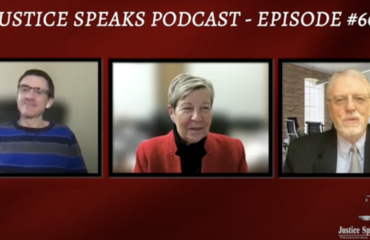Justice Speaks Podcast #74
Justice Speaks is continuing its series about the role of State Treatment Court Coordinators examining Problem-Solving Courts in Illinois. This episode is sponsored by Reconnect.
In this episode we interview Mr. Bill Blundell, Statewide Problem-Solving Court Manager at the Administrative Office of the Illinois Courts. Mr. Blundell offers a detailed and thoughtful overview of Illinois’ approach to supporting, expanding, and strengthening Problem-Solving Courts across the state. Drawing on his extensive experience in both behavioral health and court services, he outlines the strategic frameworks and collaborative efforts that are shaping Illinois’ leadership in the Problem-Solving court movement.
About Bill Blundell, State Treatment Court Coordinator
The conversation begins with a brief introduction to Mr. Blundell’s professional background. Originally trained as a mental health clinician, he transitioned into the field of probation, where he was first introduced to Problem-Solving Courts in Illinois during his initial week as a probation officer. This early exposure ignited a lasting commitment to this judicial model, eventually leading to his management of four distinct Problem-Solving Courts in Peoria County—specifically, Drug, Mental Health, DUI, and Veterans Treatment Courts. His work at the local level provided a strong foundation for his current statewide leadership role.
Problem-Solving Courts in Illinois
In his position at the Administrative Office of the Illinois Courts, Mr. Blundell is responsible for overseeing training and technical assistance for 122 Problem-Solving Courts throughout the state. He also ensures statewide compliance with the Illinois Supreme Court’s Problem-Solving Court Standards and facilitates the efforts of the Supreme Court Committee on Justice and Mental Health Planning. This committee, which includes five subcommittees, addresses complex issues such as civil mental health matters and fitness for trial. Mr. Blundell explains how this structure allows for robust, multidisciplinary input and a strategic approach to policy development.
Comprehensive Training for Illinois’ Problem-Solving Courts
A major focus of the episode is the state’s comprehensive training initiatives. Mr. Blundell describes a structured curriculum developed to support Problem-Solving court teams, consisting of 17 courses available in both online and in-person formats. These courses address critical topics such as planning and administration, team dynamics, use of incentives and sanctions, and the integration of technology. He emphasizes that the Probation Services Division supports the salaries of probation officers and encourages jurisdictions to pursue grant funding to support additional programming needs.
Mr. Blundell also shares insights into Illinois’ success in securing federal funding, including a second Bureau of Justice Assistance (BJA) grant awarded in 2023. This funding allowed five Drug Courts to enhance services, demonstrating how effective planning and evidence-based practices can attract national support and yield meaningful improvements for local courts and participants.

Rural Courts and Funding
The discussion turns to the persistent challenges surrounding court funding, particularly in rural areas. Mr. Blundell describes innovative regional collaborations in which counties join together to establish and operate a shared Problem-Solving court, thereby optimizing resources. He also addresses broader funding opportunities, suggesting that revenue from marijuana sales in Illinois could be a potential source of sustainable funding, similar to how other states have implemented specialized taxes to support these initiatives.
Looking toward the future, Mr. Blundell underscores the importance of continuous quality improvement. He encourages courts to conduct internal assessments annually and obtain independent evaluations at least every five years. He also highlights the introduction of team self-assessment tools to foster a culture of reflection and professional development. His vision includes not only sustaining existing courts but also expanding access to Drug, DUI, Mental Health, and Veterans Treatment Courts, and exploring emerging models such as courts for transitional-age youth.
Conclusion
In closing, Mr. Blundell expresses his appreciation for the opportunity to share the progress Problem-Solving Courts in Illinois have made in advancing their initiatives. His commitment to thoughtful planning, collaborative leadership, and innovation offers valuable insights for practitioners, policymakers, and court leaders committed to enhancing access to justice and improving outcomes through specialized court models.
We wish to thank Mr. Blundell for joining us on Justice Speaks. We also wish to thank Reconnect for sponsoring this podcast episode.
Get more articles like this
in your inbox
Subscribe to our mailing list and get the latest information and updates to your email inbox.
Thank you for subscribing.
Something went wrong.






